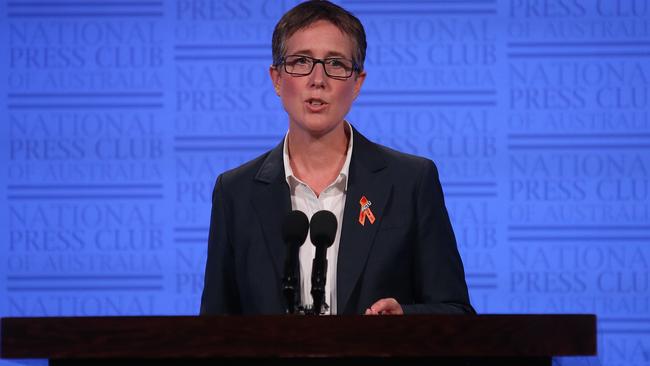McManus dreaming if she thinks laws can save unions
There are two ways to see the call to arms by ACTU boss Sally McManus: she doesn’t get it or she thinks we can relive the 60s.

There are two ways of looking at the call to arms by ACTU secretary Sally McManus, released yesterday. Either she just doesn’t get it or she thinks we can relive the 1960s when nearly all jobs were full-time and permanent (at least until they disappeared). It was a bad time for women workers, but what the heck.
Either way, the notion that legislation can save the rapidly disappearing and irrelevant union movement is naive, at best, and destructive, at worst.
Here’s the thing: big business is not the enemy of trade unions. They pay higher wages and conditions than small business and they are much more likely to deal with unions in certain circumstances. To be sure, if they are reallysloan pushed, they will want out — witness the steady flow of firms seeking to have unwieldy enterprise agreements terminated by the Fair Work Commission.
The paths of small business and unions rarely cross; after all, there is not the payoff for unions to seek new members in this space, even if it accounts for some 80 per cent of all employees. But legislation can really have an impact on small business and this is where McManus is misguided.
Casual employment makes up about a fifth of total employment, and this has not budged in over two decades. Employment through labour hire firms also has changed very little and is low, about 2 per cent. The number of self-employed contractors has, if anything, shrunk over the past decade. And note that casual workers are paid a 25 per cent premium to compensate for the loss of paid leave, almost unheard of elsewhere in the world.
McManus is more than happy to ignore the facts. She wants almost compulsory transition of casual to permanent status, even though Fair Work refused a similar claim by the ACTU only last year. The overseas evidence is very clear: regulatory attempts to limit temporary employment lead to higher unemployment and the marginalisation of vulnerable workers.
McManus wants a national regulatory framework for labour hire companies, no doubt mimicking some of the overbearing legislation passed by Labor states.
Notwithstanding the fact that the FWC is stuffed with Labor appointees, she happily now calls the institution the Unfair Work Commission — very droll. I guess she will want a veto over appointments should Labor win the next federal election.
If not for the unions’ hold over Labor — the party is really a wholly owned subsidiary of the union movement — McManus’s ruminations would hardly be newsworthy. But the list of her legislative demands is being refined and Brendan O’Connor, shadow employment minister, is taking copious notes. There is a clear expectation that Labor will deliver. Don’t expect any resistance from the Greens.
The bottom line, however, is that if McManus thinks that a change to the legislation, which after all is just over a decade old and was crafted by Labor for the unions, will reinvigorate the union movement, she is sadly mistaken. Having said that, there could be collateral damage to business and the economy.





To join the conversation, please log in. Don't have an account? Register
Join the conversation, you are commenting as Logout